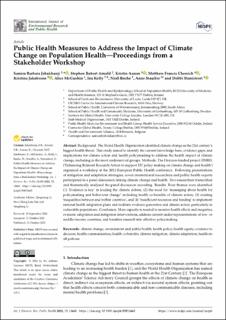Public Health Measures to Address the Impact of Climate Change on Population Health—Proceedings from a Stakeholder Workshop
| dc.contributor.author | Jabakhanji, Samira Barbara | |
| dc.contributor.author | Arnold, Stephen Robert | |
| dc.contributor.author | Aunan, Kristin | |
| dc.contributor.author | Chersich, Matthew Francis | |
| dc.contributor.author | Jakobsson, Kristina | |
| dc.contributor.author | McGushin, Alice | |
| dc.contributor.author | Kelly, Ina | |
| dc.contributor.author | Roche, Niall | |
| dc.contributor.author | Stauffer, Anne | |
| dc.contributor.author | Stanistreet, Debbi | |
| dc.date.accessioned | 2024-02-20T08:16:47Z | |
| dc.date.available | 2024-02-20T08:16:47Z | |
| dc.date.created | 2022-10-24T16:16:19Z | |
| dc.date.issued | 2022 | |
| dc.identifier.issn | 1661-7827 | |
| dc.identifier.uri | https://hdl.handle.net/11250/3118557 | |
| dc.description.abstract | Background: The World Health Organization identified climate change as the 21st century’s biggest health threat. This study aimed to identify the current knowledge base, evidence gaps, and implications for climate action and health policymaking to address the health impact of climate change, including in the most underserved groups. Methods: The Horizon-funded project ENBEL (‘Enhancing Belmont Research Action to support EU policy making on climate change and health’) organised a workshop at the 2021-European Public Health conference. Following presentations of mitigation and adaptation strategies, seven international researchers and public health experts participated in a panel discussion linking climate change and health. Two researchers transcribed and thematically analysed the panel discussion recording. Results: Four themes were identified: (1) ‘Evidence is key’ in leading the climate debate, (2) the need for ‘messaging about health for policymaking and behaviour change’ including health co-benefits of climate action, (3) existing ‘inequalities between and within countries’, and (4) ‘insufficient resources and funding’ to implement national health adaptation plans and facilitate evidence generation and climate action, particularly in vulnerable populations. Conclusion: More capacity is needed to monitor health effects and inequities, evaluate adaptation and mitigation interventions, address current under-representations of low- or middle-income countries, and translate research into effective policymaking. | en_US |
| dc.language.iso | eng | en_US |
| dc.publisher | MDPI | en_US |
| dc.rights | Navngivelse 4.0 Internasjonal | * |
| dc.rights.uri | http://creativecommons.org/licenses/by/4.0/deed.no | * |
| dc.subject | climate change | en_US |
| dc.subject | environment and public health | en_US |
| dc.subject | health policy | en_US |
| dc.subject | health equity | en_US |
| dc.subject | evidence to decision | en_US |
| dc.subject | health communication | en_US |
| dc.subject | health co-benefits | en_US |
| dc.subject | climate mitigation | en_US |
| dc.subject | climate adaptation | en_US |
| dc.subject | health-in-all-policies | en_US |
| dc.title | Public Health Measures to Address the Impact of Climate Change on Population Health—Proceedings from a Stakeholder Workshop | en_US |
| dc.title.alternative | Public Health Measures to Address the Impact of Climate Change on Population Health—Proceedings from a Stakeholder Workshop | en_US |
| dc.type | Peer reviewed | en_US |
| dc.type | Journal article | en_US |
| dc.description.version | publishedVersion | en_US |
| dc.source.volume | 19 | en_US |
| dc.source.journal | International Journal of Environmental Research and Public Health (IJERPH) | en_US |
| dc.source.issue | 20 | en_US |
| dc.identifier.doi | 10.3390/ijerph192013665 | |
| dc.identifier.cristin | 2064594 | |
| dc.relation.project | Norges forskningsråd: 310672 | en_US |
| cristin.ispublished | true | |
| cristin.fulltext | original | |
| cristin.qualitycode | 1 |
Tilhørende fil(er)
Denne innførselen finnes i følgende samling(er)
-
Journal articles [478]

